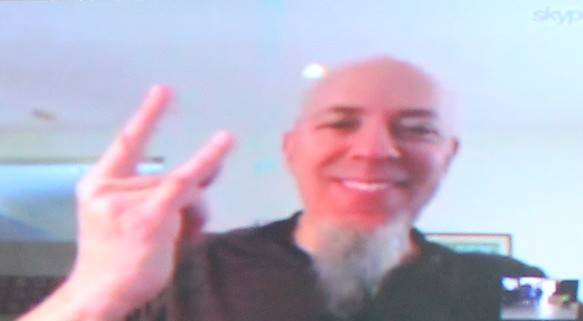Editor’s Note: This story is republished from Shonika Proctor’s February 2012 monthly print column in I Love Chile English language newspaper where the article first appeared.
Somewhere between the physical world and the virtual world, the creative world and the technical world, lies the world that Gled built.
Originally started as a project out of the Universidad Técnica Federico Santa María, UTFSM, (Chile’s leading Science, Technology and Engineering School) by classmates Aníbal Valencia, Juan Pablo León, Tomás Mardones and Gonzalo Vallejos, the multi-award winning company, Gled, has risen to become one of Latin America’s (and in many regards) one of the world’s leading providers of augmented reality (AR) customized applications.
As Augmented Reality (AR) has yet to be widely adopted in the mainstream marketplace, when you look at competitive players and industry pioneers, you must look on an international level as there is not yet one area of the country or world where a company has built a dominant brand name in the AR space.
Augmented Reality and Disruptive Technology
Augmented Reality is considered a spin off or an extension of Virtual Reality. Virtual Reality was discovered in the late 1950’s or early 1960’s by Morton Heilig, a cinematographer who patented a simulator that provided different sensory options. But like most new technologies, no matter how cool it seems, there usually is not a relevant use or existing consumer market that would purchase the product or application once it has been discovered. So research is ‘harvested’ for years and the project remains in stealth mode usually while being tested in some high profile North American corporation research lab or at a remote offshore military facility.
It is only in recent years (since the latter part of the 90’s) that Augmented Reality has spun off from the Virtual Reality space and is starting to be adopted in more mainstream industries ranging from gaming to transportation.
Learn more about Augmented Reality
Gled Pioneers the AR Industry in Latin America
Gled received its first major exposure in the world and the world of Augmented Reality when it became the first Chilean team to win the Intel® Challenge (2010).
[vimeo]http://vimeo.com/15668864[/vimeo]
This opened up the opportunity to participate in the Intel® +Berkeley Technology Entrepreneurship Challenge.
IBTEC is a global competition of technological business plans where some of the world’s best entrepreneurs and projects in the world converge. Prior to winning the Intel® Challenge, Gled had been prototyping and participating in numerous locally sponsored competitions as a way to gain exposure, build their network and further validate their ideas.

It was as early as 2007 when their work started being recognized and discovered in Chile as it was during that year they won Emprendedores.NET, a competition hosted by Microsoft and UTFSM, and received licenses, office space and seed capital to build their prototype. They later received an honorable mention and funding at the Santander 100k, which was organized by Santander and Southern Angels from Octantis. And they also was one of the winning awardees at the Sub35 competition, which is the digital scouting initiative inspired by País Digital (Foundation). The grand prize was a trip to South Korea which they are anxiously awaiting to depart for in March 2012.
Playing with International Possibilities
Currently Gled is best known in Latin America for their commercialization strategies for different customer segments, such as marketing and advertisement agencies, software developers and brand agencies. They have done a broad range of custom work from designing Augmented Reality games for cereal boxes to a developing a specialty application for a notebook/laptop cover for Rhein Motion.
Their high profile clients include the who’s who of internationally recognized multinational companies such as Chevrolet, Intel and Nestle among others where they have been able to integrate their flagship products (IVEO Desktop and IVEO Web) into the companies marketing mix. These programs are capable of adding virtual elements to the real world in many novel and surprising ways, simply by placing printed patterns such as [bar]codes, pictures or brands in front of a webcam.
[vimeo]http://vimeo.com/15806514[/vimeo]
Between their award recognition and their growing multinational client base, they are constantly affirming they are on the cutting edge of development in this next generation technology space. And with a home base of Viña del Mar(Chile), they are shining the light on the depth of talent coming not only out of Chile but also outside of Santiago where much of Chile’s technological, entrepreneurial and startup communities are centralized.
In 2011 Gled was selected for Global Connection (a Corfo sponsored program for technological entrepreneurs working on international projects). As a selected recipient they received the opportunity to work out of the Plug and Play Tech Center based in Silicon Valley, California region. Plug and Play Tech Center provides a support ecosystem ranging from funding to shared office space and mentorship to a group of select entrepreneurs chosen from different regions around the world.
Gled recently returned from their 3 month stay where they also had the opportunity to present at the 2011 Plug and Play Winter Expo along with fellow Chilean startups SmartBoxTV, which designs interactive apps for Smart TV distributors and consumers and MonkeyContact which developed an app that allows you to find and aggregate all your contacts across social networks and email platforms.
The first milestone we accomplished in our internationalization process was closing our first international sale (client) with our technology, said Gled co-founder, Aníbal Valencia. It was very challenging, and at times seemed impossible, but we did it.
Working in the Valley gave Gled the opportunity to prospect the market, expand their network and learn from the main competitors, and while they loved their experience working with the international marketplace, they realize that their real and immediate opportunities are here in Chile’s rapidly growing technology and innovation community. Thus they are aggressively looking to reach more multinational firms and companies looking to launch or grow their operations in Chile and/or Latin America using hybrid and social engagement marketing techniques.
As for what’s it like to be an entrepreneur in an ‘augmented world’ that is as abstract as it is physical, Aníbal says that it is important to fully believe in your idea but be careful that you don’t get blindsided because you failed to follow suggestions by more experienced people.
How’s that for keeping it real?
Connect with Gled:


